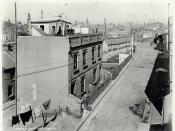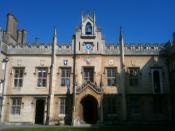Cambridge University
The history of Cambridge began in the first century BC, when an Iron Age tribe established a settlement on
Castle Hill. A ford was built at the foot of the hill to cross the River Cam, originally known as Granta, the
river upstream of Silver Street Bridge still retains its old name.
Later the Romans took over this site which was an important crossing point, marking the meeting place
of the Roman Roads, in particular the Via Devana which linked Colchester to Chester. It was the Normans
who built a castle here as a base for fighting Hereward the Wake, the Saxon rebel. The mound of William
the Conqueror's castle is still in existence, from where on a clear day you can see the lantern tower of
Ely Cathedral.
In the 12th century, students attended schools attached to the Monasteries and Cathedrals and as
Universities developed in Italy and France scholars migrated from one centre to another.
Some went from
Paris to Oxford and later in the early 13th century groups arrived in Cambridge. During the 12th century
several religious orders came to Cambridge attracting sufficient numbers of students for the town to be
recognised as a seat of learning by a writ for its governance made by Henry III in 1231. At this time,
students would gather around whichever religious, or lay teachers ideas appealed to them and had to make
their own arrangements for living accommodation. Due to the unsatisfactory conditions in which the students
had to exist, hostels were set up in the care of the masters and from this the college system evolved. It was
not until 1284 that the first college came into being when Hugo de Balsham, Bishop of Ely, founded Peterhouse.
As the University grew and took over more of...


